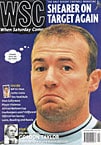 Davy Millar remembers a welcome disraction from the troubled times that haunted Belfast in the Seventies
Davy Millar remembers a welcome disraction from the troubled times that haunted Belfast in the Seventies
Back in 1975 I rarely needed an excuse to leave school as quickly as possible but on April 16 there was a very good reason for making an even quicker departure than usual.
The reason for all the excitement was the visit of Yugoslavia for a European Championship qualifier. The Slavs weren’t the most glamorous opponents although they were obviously a decent side to judge from their recent record. There wasn’t even the excuse of this being a vital game in our quest to win the group because nobody’s expectations ran to such an outlandish notion – respectability was our aim and even that was under threat after handing Norway their first competitive victory in years. The fact that the game was taking place at Windsor Park, well, that was something to get excited about.
Belfast has seldom had a good image, but the 1970s marked a new low in its appeal to visitors. Bombings, shootings, mass murder, religious bigotry and political fanaticism convinced millions to put Belfast somewhere behind hell on their must-visit itinerary. Hard-living, devil-worshipping rockers politely declined the chance to tour here while the committed protest singers decided the best place to voice their opinions was from a safe distance.
Another group conspicuous by their absence were international footballers; not since the Soviet Union in October 1971 had a national side dared to set foot in the Province. Nobody blamed them – the fault was ours – but it was a depressing reminder of our general isolation from normality. We listened to our radios as the Northern Ireland team trekked up and down England in search of a crowd for their “home” games, fearing that the pitiful attendances might force us to withdraw from intemational football. Then, miraculously, Yugoslavia agreed to play here and, after a couple of nervous months waiting for something to go wrong, there were thousands of people converging on Windsor. I’d never seen such crowds in Belfast before, at least none with-out balaclavas or marching bands attached, and it was too wonderfully strange to take in at first.
At ten to five when the teams emerged from the tunnel, a cold, grey April evening was transformed into a carnival. The match itself was always going to struggle to live with such a build-up and, for a while, it proved a dull and cagey affair. It didn’t matter to me, because I was too busy being enthralled by players I’d only read about but who were now just yards away from me – our team, that is, not theirs. Pat Jennings’s presence was a bit too much to take in but Sammy McIlroy was just about believable. Never mind that Man Utd were a Second Division outfit at the time, he was enough of a hero for me. The willowy Martin O’Neill contrasted perfectly with player-manager Dave Clements who had a surprisingly large gut for an international footballer. Best of all was the previously unknown Derek Spence of Bury whose blond feather-cut was gracing the international stage for the first time. Although he looked about 16 and occasionally betrayed his Third Division background, he was giving the much-praised Slav defence a horrible time. Poised, sophisticated players who could hold their own against the best strikers in the world couldn’t handle a kid from north Belfast.
In fact, none of their side was having a good time against any of the home players. In their entire history, Northern Ireland have only rarely been so dominant in a match and probably never against so highly rated opponents. Only on such a special occasion could they have created so many chances and only Northern Ireland could have missed those chances in such a variety of ways. In the end, it was typical that of the three times we put the ball in the net, the two impressive strikes were ruled out and we had to rely on a scrappy effort from Brian Hamilton to cap a magnificent performance with a narrow victory.
At full-time the visitors disappeared pretty sharpish leaving our lot to milk their well-deserved standing ovation. Being part of that ecstatic crowd, and then seeing all the happy faces swarming up the little side streets from Windsor to the Lisburn Road, not hearing one angry voice, having a laugh with complete strangers, was to feel part of something special, something new. It was like the end of a war, the end of our isolation from the rest of the world; no longer would we have to put up with everybody’s pity or scorn because now we had something to be proud about. We’d been through hell but now we were back and we were winners.
It was a short-lived phenomenon. Yes, our football isolation was over but, as yet another political process failed and violence returned to the streets, we went back to being the failures of western civilisation. The problem was that only one part of Northern Ireland had won that day; another part didn’t feel represented by that team at all and felt nothing of the emotion surrounding the game. Twenty-five years later and the divide is as wide as ever.
From WSC 158 April 2000. What was happening this month